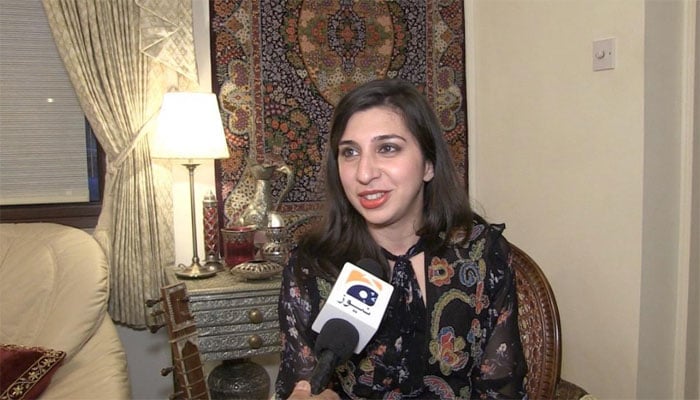Winning MasterChef changed my life forever, says Dr Saliha
British Pakistani MasterChef winner Dr Saliha Mahmood has said that winning the coveted competition last year changed her life in a number of ways but she is most proud that she is seen as a role model for a new generation of British Asian and Muslim girls growing up in Britain.
LONDON: British Pakistani MasterChef winner Dr Saliha Mahmood has said that winning the coveted competition last year changed her life in a number of ways but she is most proud that she is seen as a role model for a new generation of British Asian and Muslim girls growing up in Britain.
A year after winning the competition, Dr Saliha spoke to The News for a detailed interview at her family home for how the journey has been, of winning a competition that was viewed by tens of millions of people on television. Dr Saliha comes from a family full of doctors: her husband is a doctor; her parents (who hail from near Lahore and are surgeons with the National Health Service (NHS) are doctors; her younger sister and brother are doctors and her brother-in-law is a doctor too; and so are her extended family members.
She said about the experience that put her from obscurity into total limelight.
“Winning MasterChef has been a life-changing experience. After I won the competition I suddenly went from being anonymous to people on the street recognizing me. MasterChef is a BBC programme and the final was watched by millions of people worldwide, with over 7 million viewers for the final. I was a doctor then and I am still a doctor, but when I went to my clinic after winning the show, many of my patients recognised me instantly. Some consultations took double the time as my patients would ask me about the Masterchef and not the medical issues they faced. Some were more interested in knowing about what it was like being part of the show,” she told.
Over the course of one year, Dr Saliha has made a number of appearances in mainstream print and electronic media. She said: “I have written articles for the English press on cooking recipes includes highbrow publications like The Times. I have appeared as a guest on cookery shows for the BBC, ITV and other channels. I have taken part in numerous food festivals, Halal food festivals, BBC food festivals and other regional cookery celebrations. I have been lucky enough to speak at the House of Commons on the empowerment of women.”
Dr Saliha said that for her to be seen as a role model for the young Asian, Muslim girls is important. “It is flattering when I am seen as someone who has many interests, is confident, empowered, a family person with myriad interests and independence who was able to achieve her personal goals. I celebrate my identity as a Muslim British girl of Pakistani heritage.”
The MasterCheff winner won the competition because of her unique cooking style – the sprinkling of Pakistani good.
“I can cook food of many styles and genres. I cook Thai, Pan-Asian, British amongst other cuisines. I try my best to promote Pakistani cuisine as this is important to me. I want to show how wonderfully diverse and delicious our food is. I always try to make food which we are used to but I add my own little twist to it- I feel that this is what helped me win Masterchef.”
Dr Saliha’s husband Dr Usman Ahmed said she has been cooking foods of various kinds at home all the time, and still does despite being a busy working mother. “Her style is different and together we always do recipe testing. That also includes dessert testing which is my favourite part. I have always encouraged her to excel in all that she does.”
Dr Saliha is a fluent Urdu speaker and credit goes to her parents who have ensured that their kids learn Urdu very well. Her father Dr Tariq Mahmood is a well-known and published Urdu poet.
“We always encouraged our children to learn Urdu and insisted that they should never mix English with Urdu. We paid attention and ensured that our three children, Saliha, Maria and Taha learnt Urdu. I used to tell them when they were young that they can fight with each other if they wish, but fight in Urdu not English.”
Dr Amina Khatoon, her mother, said that from a very young age, she taught her daughters the manners that are “central to our culture and family life”.
She added: “I told them that we should cook fresh food everyday and our food should be healthy and special. In the kitchen I made sure that they join me and learn the skills as well as ensuring that they grow up with the right kind family values.”
Her brother Taha Mahmood, sister Dr Maria and brother-in-law Dr Daanesh Zakai said becoming a doctor was always her passion but cooking was another passion that she loved and wanted to excel in and presented a beautiful amalgamation of our culture, of East meeting West.
-
Security forces gun down 30 terrorists in multiple IBOs in KP: ISPR
-
MQM-P calls for new province in Sindh
-
US report validates Pakistan military edge over India: PM
-
Banned TTP poses serious threat to Pakistan security: UNSC panel
-
CM Afridi clarifies remarks on by-poll after ECP requests army deployment
-
Dubai sees 3.2m Pakistani passengers in 2025 as airport sets new milestone
-
Security forces kill 23 Indian proxy terrorists in KP's Kurram
-
Pakistan to construct island to boost oil exploration: report












